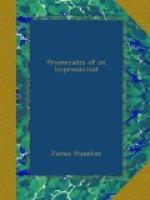Watteau was a consumptive; he died of the disease. A consumptive genius! It is a hard saying. People of average health whose pulse-beat is normal in tempo luckily never realise the febrile velocity with which flows the blood in the veins of a sick man of genius. But there is a paradox in the case of Watteau, as there was in the case of Chopin, of Keats, of Robert Louis Stevenson. The painter of Valenciennes gave little sign of his malady on his joyous lyrical canvases. Keats sang of faery landscapes and Chopin’s was a virile spirit; the most cheerful writer under the sun was Stevenson, who even in his Pulvis et Umbra conjured up images of hope after a most pitiless arraignment of the universe and man. And here is the paradox. This quartet of genius suffered from and were slain by consumption. (Stevenson died directly of brain congestion; he was, however, a victim to lung trouble.) That the poets turn their sorrow into song is an axiom. Yet these men met death, or what is worse, met life, with defiance or impassible fronts. And the world which loves the lilting rhythms of Chopin’s mazourkas seldom cares to peep behind the screen of notes for the anguish ambushed there. Watteau has painted the gayest scenes of pastoral elegance in a land out of time, a No-Man’s Land of blue skies, beautiful women, gallant men, and lovely landscapes, while his life was haunted by thoughts of death.




